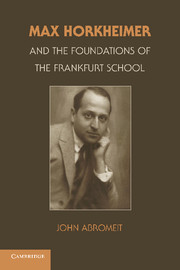Book contents
- Frontmatter
- Contents
- Acknowledgments
- A Note on References and Permissions
- Introduction
- 1 Coming of Age in Wilhelmine Germany
- 2 Student Years in Frankfurt
- 3 A Materialist Interpretation of the History of Modern Philosophy
- 4 The Beginnings of a Critical Theory of Contemporary Society
- 5 Horkheimer’s Integration of Psychoanalysis into His Theory of Contemporary Society
- 6 Horkheimer’s Concept of Materialism in the Early 1930s
- 7 The Anthropology of the Bourgeois Epoch
- 8 Reflections on Dialectical Logic in the Mid-1930s
- Excursus I The Theoretical Foundations of Horkheimer’s Split with Erich Fromm in the Late 1930s
- Excursus II Divergence, Estrangement, and Gradual Rapprochement
- 9 State Capitalism – The End of Horkheimer’s Early Critical Theory
- Epilogue
- Selected Bibliography
- Index
- References
Excursus I - The Theoretical Foundations of Horkheimer’s Split with Erich Fromm in the Late 1930s
Fromm’s Critique of Freud’s Drive Theory
Published online by Cambridge University Press: 05 June 2012
- Frontmatter
- Contents
- Acknowledgments
- A Note on References and Permissions
- Introduction
- 1 Coming of Age in Wilhelmine Germany
- 2 Student Years in Frankfurt
- 3 A Materialist Interpretation of the History of Modern Philosophy
- 4 The Beginnings of a Critical Theory of Contemporary Society
- 5 Horkheimer’s Integration of Psychoanalysis into His Theory of Contemporary Society
- 6 Horkheimer’s Concept of Materialism in the Early 1930s
- 7 The Anthropology of the Bourgeois Epoch
- 8 Reflections on Dialectical Logic in the Mid-1930s
- Excursus I The Theoretical Foundations of Horkheimer’s Split with Erich Fromm in the Late 1930s
- Excursus II Divergence, Estrangement, and Gradual Rapprochement
- 9 State Capitalism – The End of Horkheimer’s Early Critical Theory
- Epilogue
- Selected Bibliography
- Index
- References
Summary
Having established the basic concepts and methods that characterized Horkheimer’s model of Critical Theory through approximately 1938, we are now in a position to identify the causes and consequences of the rather dramatic shift in his thought that occurred in the subsequent years. At the risk of being overly schematic, one could say that the three most important factors in this shift were Horkheimer’s break with Fromm, his increasingly close working relationship with Theodor Adorno, and his general acceptance of Friedrich Pollock’s argument about the emergence in the 1930s of a new form of “state capitalism.” This brief excursus will examine the theoretical causes and consequences of Horkheimer’s break with Fromm. The following, lengthier excursus will address Horkheimer’s shifting relationship with Adorno in the 1930s. After setting the stage with these two excursuses, we will be able to add the final piece of the puzzle of Horkheimer’s shift, namely the new concept of “state capitalism.”
In this study so far, a significant amount of space has been devoted to reconstructing the early theoretical development of Erich Fromm. This careful examination of the early Fromm is justified insofar as Horkheimer’s own early theoretical development cannot be understood apart from Fromm’s influence. Already in the late 1920s, Horkheimer had sought to secure Fromm’s loyalty by offering him a lifetime membership in the Institute and an opportunity to conduct a major research project on the attitudes of the German salaried employees and workers. What strikes the close observer of the development of Critical Theory in the late 1920s and early 1930s are the remarkable similarities and complementarity of the work of Fromm and Horkheimer. It is not an exaggeration to say, as Rolf Wiggershaus does, that Fromm was Horkheimer’s most important theoretical interlocutor during this time. Although Horkheimer was always the senior partner in the relationship, Fromm’s psychoanalytic training and his abiding interest in applying psychoanalytic categories to social and historical problems put him in a position not only to collaborate with Horkheimer, but also genuinely to contribute to the advancement of Critical Theory. As we have seen in earlier chapters, Horkheimer and Fromm were both interested in a selective and critical appropriation of psychoanalytic categories, which would be placed within a larger Marxist theory of history and society. Both were interested, in particular, in using Freud’s early drive theory and his notions of introversion, repression, and compensation to revise and bring up to date Marx’s theory of ideology. The collaboration between Horkheimer and Fromm reached a high point in 1935, when Fromm completed his introductory essay for the Institute’s collective Studies on Authority and Family, which was published at the beginning of 1936. Fromm’s essay presented a psychoanalytic analysis of the sadomasochistic character, whose origins and development Horkheimer would subsequently seek to explain historically in his 1936 essay, “Egoism and Freedom Movements.” At this point, there was still an extensive unity in Horkheimer and Fromm’s theoretical interests and approaches.
- Type
- Chapter
- Information
- Max Horkheimer and the Foundations of the Frankfurt School , pp. 336 - 348Publisher: Cambridge University PressPrint publication year: 2011



